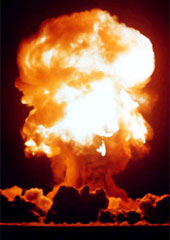How Israel Helped a Rogue State Go Nuclear
Should Israel’s nuclear collaboration with South Africa’s apartheid-era regime change the way we think about the prospect of a nuclear Middle East?
April 5, 2013

There have been rumors since the late 1970s of Israeli cooperation in South Africa’s effort to become a nuclear power. A double flash over the Indian Ocean detected by a U.S. satellite in 1979, for example, was suspected (but never confirmed) to be a joint, low-yield Israeli-South African nuclear test.
South African documents that appeared to show Israel offering to sell nuclear weapons were refuted by Israeli President Shimon Peres, in 2010, as “selective interpretation.” Here we show what really occurred — and how.
According to new CIA evidence, Israel proved “absolutely vital” to South Africa’s apartheid regime 30 years ago in building six Hiroshima-size bombs. New details about this collaboration arose in a series of interviews I conducted with Tyler Drumheller, the former chief of CIA covert operations in Europe and, at the time of the events described here, a clandestine officer serving in Pretoria, South Africa. The interviews were conducted in Washington, D.C., in 2010.
Drumheller is an unusually credible and outspoken man. In his book, On the Brink: An Insider’s Account of How the White House Compromised American Intelligence and in interviews with the CBS News program “60 Minutes,” he was the most senior of former CIA officials to tell the truth about faulty intelligence in the run-up to the U.S. invasion of Iraq.
He showed how the Bush-Cheney White House had promoted intelligence it liked on Iraq — and specifically on Iraq’s supposed weapons of mass destruction — while ignoring intelligence it didn’t like.
Having begun his career in the unusually risky role of “NOC” (non-official cover) in Asia, Drumheller’s operational abilities remain legendary within the CIA’s Clandestine Service.
During our interviews, he reflected on earlier experiences in his career. In 1980, “we had 11 case officers in South Africa, four of them with deep cover.” They had penetrated the apartheid regime’s “Project Circle,” which was already within reach of perfecting a usable, deliverable atomic bomb.
“We were regularly able to obtain swipe samples from its enrichment facilities. We could monitor progress,” Drumheller told me.
They also monitored the deep cover “black station” of Israel’s intelligence agency, the Mossad. Drumheller said this was a front company called TamCo. The Israelis had no idea they were under such close U.S. scrutiny.
Washington had tried to impede Pretoria’s effort by embargoing the shipment of a VAX computer from Massachusetts-based Digital Equipment Corporation. “Project Circle needed that VAX” to complete the project, Drumheller said.
The CIA station in Pretoria learned that South Africa was able to get around the embargo by having the computer — the same powerful VAX model — transshipped from the United States. “It came via the Israelis and TamCo,” Drumheller said.
Israel contributed another vital piece to Project Circle’s success by supplying the tritium, a radioactive form of hydrogen that is manufactured in nuclear reactors, for the bombs’ triggering mechanisms. In addition, Israel provided Pretoria with an essential avionics package that would allow the bombs to be dropped by South African Air Force jets.
The CIA was able to obtain these and other details about the Israeli-South African collusion, Drumheller explained, from a stellar agent that the CIA had placed within Project Circle.
The CIA station in Pretoria was tracking full-scale government-to-government collaboration that was taking place despite a UN Security Council resolution that had imposed a mandatory arms embargo against the white supremacist state in 1977.
Washington, meanwhile, had enough on its hands with Israel during this period. Strains in relations included Israel’s 1982 Operation Peace for Galilee invasion of Lebanon. The extent of the invasion’s civilian carnage led President Ronald Reagan (choosing his words carefully, as is known from his diary) to denounce the bombing and shelling of civilians to Israel’s prime minister as “a holocaust.”
In any event, Pretoria finally took it upon itself to dismantle its jointly developed bombs in 1989, two years before signing the Nuclear Non-Proliferation Treaty. All of this happened in the apartheid regime’s dying days, before its complete collapse in 1994.
Are these collusions historical bygones? Too long ago to matter today? Certainly not, given what’s now underway with regard to U.S policy on Iran.
The key question now is how Washington will act, or react, regarding the Iranian nuclear challenge. To judge from comments by figures in leading U.S. foreign policy circles outside the government, no one in Washington has a clue as to what Tehran intends to do with its nuclear program.
What is apparent, however, is the influence of Israeli fears, or bluster: If Washington doesn’t prevent Iran from getting the bomb, it is assumed, then Israel will.
Even so, Israel’s own nuclear capabilities are almost never discussed. And, quite conveniently, Israel’s record of proliferation is barely known or, rather, swept under the carpet.
It is also worth recalling former U.S. Defense Secretary Donald Rumsfeld’s outrage in 2005 over what he called Israel’s “deceptive” sales of U.S. high technology weaponry to China. It was not the first time that such transshipments to China had occurred.
Today, that fact may be recalled only by Pentagon insiders. But it points to an altogether troubling record of Israel’s custody of the deadliest of weapons, including its nuclear capacities.
A screwdriver away?
In my view, what is now likely to occur in U.S. relations with Iran is a variation on the classic “oops moment”.
Such a moment occurs when a problematic state acquires its nuclear weapons capability despite a lengthy series of public and private threats from the United States, as well as the application of economic pressures, often in secret. (In the case of Iran, however, the state would only be a screwdriver away.)
Despite the threats and pressures, the country in question suddenly achieves a nuclear weapons capability: Oops. The game changes. Such “oops moments” occurred successively with China, Israel, India, Pakistan, South Africa and, most recently, North Korea.
Might Washington be reacting differently now, compared to all the previous cases? If so, why? Just because it is Iran, the U.S. nemesis of the moment?
That alone would not be enough of a reason. Several of the countries just cited could also have been cast as opponents — and even grievous threats, such as Mao’s China, which pledged to obliterate American cities even if that meant losing two-thirds of its own people.
The U.S. Congress and the nation’s major media offer familiar drumbeating. It is said there is a “crisis.” But, having spent most of the last 12 years at war in Iraq and Afghanistan, Washington is unlikely to go to war again so soon. In any event, U.S. threats and supplications appear to be falling flat in Tehran.
What to do under those circumstances? Might Washington at least explore a Middle East nuclear-free zone to avoid the next “oops moment”? To do so with Iran would require inducing Israel, America’s primary client and ally in the region, to put its own nuclear weapons on the table. Maybe even to dismantle them — as South Africa did circa 1989.
Putting such pressure on a client would be the unremarkable behavior of a great power coolly acting in its own interest. But that’s unlikely to happen — at least for now.
“We are not like other countries,” Prime Minister Benjamin Netanyahu declared recently. “We are an exemplary democracy
Takeaways
Israel proved "absolutely vital" to Pretoria 30 years ago in buiding six Hiroshima-sized atomic bombs.
The Israeli-South African collusion could be tracked from inside South Africa's nuclear program, where the CIA had positioned a stellar agent.
The key question now is how Washington will act, or react, regarding the Iranian nuclear challenge.
Israel's own nuclear capabilities are almost never discussed and Israel's record of proliferation is barely known.
Might Washington at least explore a Middle East nuclear-free zone to avoid the next "oops moment"?
Read previous

When the Talent Leaves
April 4, 2013
